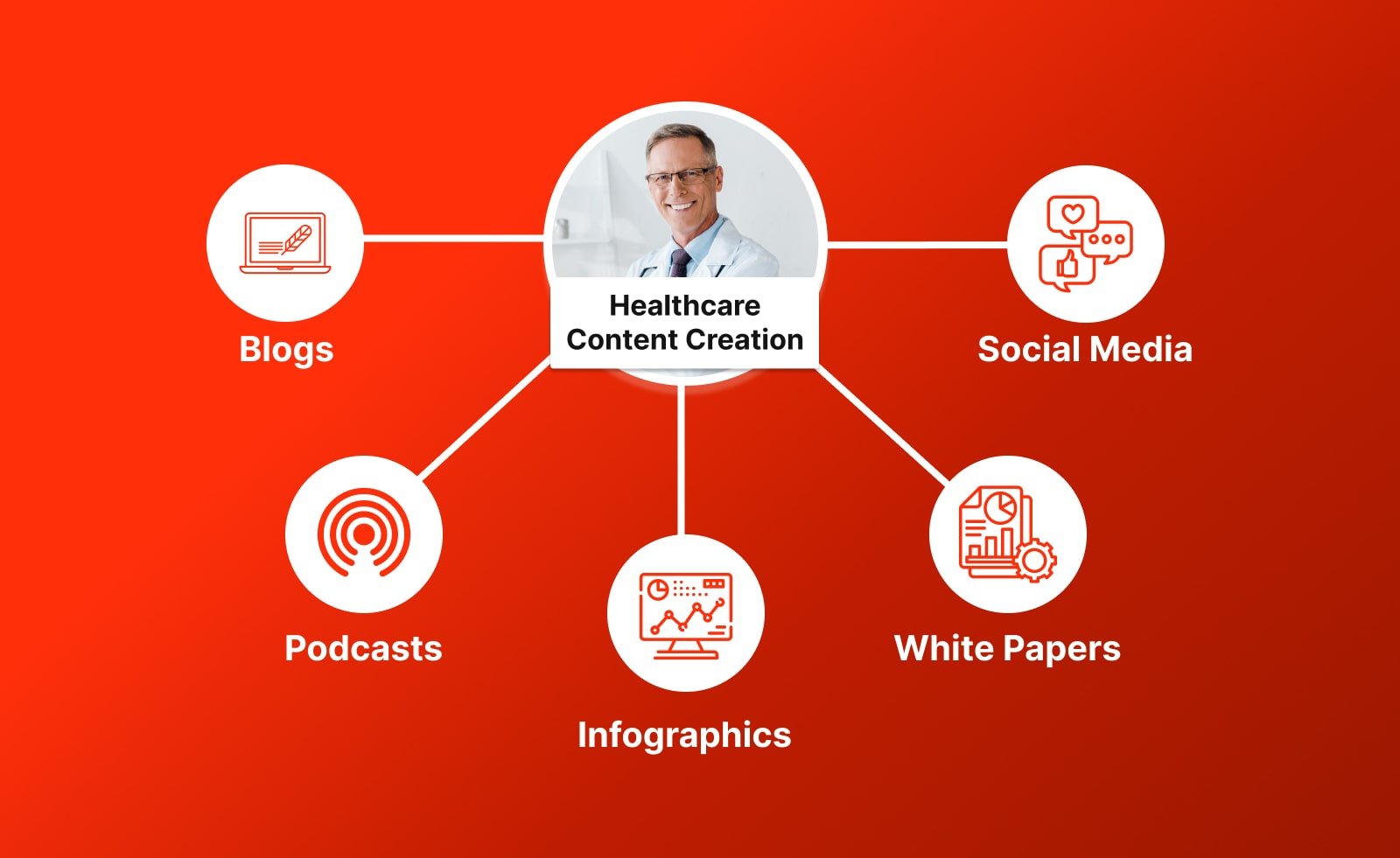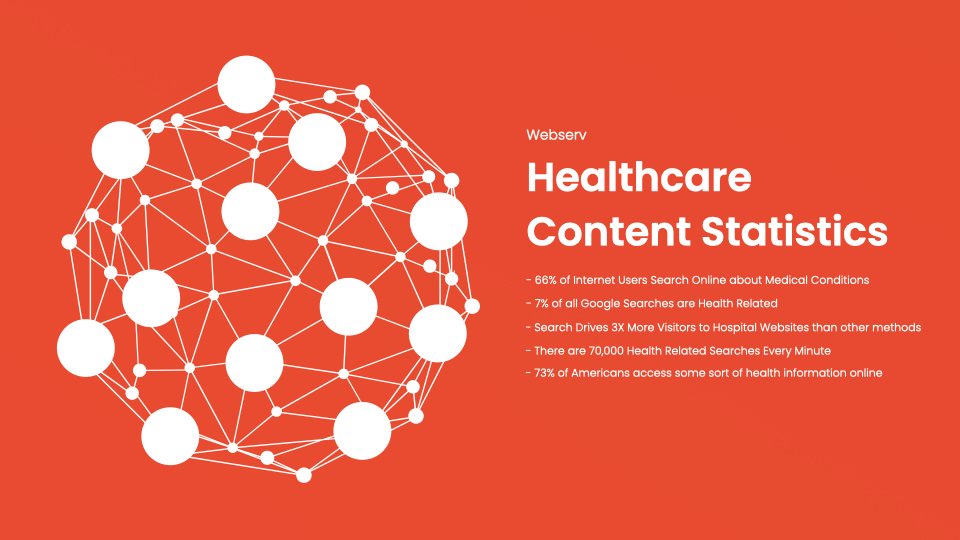
To reach their target audience in the era of digital marketing, healthcare organizations now depend heavily on content development. Healthcare professionals can position themselves as thought leaders in their industry and forge deep connections with patients through the production and dissemination of pertinent and interesting information. The development of content presents a special opportunity to demonstrate your knowledge and establish connections with your audience, whether it be through blog entries, social media updates, films, or infographics.
The power of content creation in healthcare marketing extends beyond generating leads or raising brand recognition. Additionally, it can be extremely important in empowering and educating patients, encouraging positive lifestyle choices, and removing obstacles to healthcare access. The different advantages of content production for healthcare marketing will be covered in this article, along with practical methods for producing and distributing content that appeals to your target market. This blog will offer useful insights into how content creation can alter healthcare marketing and enhance patient outcomes, whether you’re a healthcare professional, marketer, or patient.
More and more people are using the internet to discover solutions to their medical issues. It’s crucial for healthcare organizations and providers to position themselves as reliable sources of medical information given the abundance of health information available online. Healthcare providers can educate their target audience and build credibility and trust in the industry by producing and disseminating accurate, pertinent, and simple-to-understand healthcare material.
Here are some statistics that demonstrate the significance of providing healthcare information online they were pulled from “22 Healthcare Marketing Statistics To Know in 2022” by the New York Times:
Providing accurate healthcare information online has become a crucial aspect of healthcare marketing in today’s digital age. You can find even more statistics included in our other blog, “How Healthcare Content Marketing Is Redefining Your Medical Practice.”
By creating informative and accessible healthcare content, healthcare providers and organizations can establish trust, credibility, and authority in the healthcare space, while also empowering patients to take control of their health and well-being.
In order to effectively reach their target audience given the wealth of healthcare information available online, healthcare organizations and providers must develop educational and entertaining content. The key to successful healthcare marketing lies in writing high-quality content and selecting the right content types to convey your message to your target audience. Blogs, podcasts, infographics, white papers, and social media posts are some of the content forms that are most successful in healthcare marketing.
The best content type to use will depend on your marketing objectives, target market, and the sort of material itself. Each content type offers distinct advantages in terms of informing your audience.

Blogs are a popular and effective content type for healthcare marketing as they offer a versatile platform to share informative and engaging healthcare content. Blogs allow healthcare organizations to provide insights and thought leadership on a range of healthcare topics, including disease management, prevention, healthy lifestyle habits, and new treatments. By creating high-quality blog content, healthcare providers can establish themselves as credible sources of healthcare information and build trust and credibility with their target audience.
Here are a few more ways that blogs can be used in healthcare marketing:
Podcasts are a highly engaging and personal content type that can be effective in healthcare marketing. By creating high-quality podcast content, healthcare providers can establish themselves as authorities in their field and build trust and rapport with their audience. Whether you’re looking to provide in-depth information, showcase your expertise, or connect with patients on a more personal level, podcasts can be a powerful tool to help you achieve your healthcare marketing goals.
Podcasts offer a unique and intimate way to discuss healthcare topics, providing an opportunity to connect with patients and healthcare consumers on a more personal level. Unlike other forms of content, such as blog posts or videos, podcasts can create a sense of community and shared experience between the host and the listener.
Whether it’s the latest medical breakthroughs, patient experiences, interviews with healthcare professionals, or discussions on healthcare policy, podcasts can cover a broad range of healthcare topics. This allows healthcare providers to showcase their expertise and establish themselves as authorities in their field.
Podcasts are highly shareable and can be promoted on social media, email marketing, and other digital channels to reach a wider audience. This can help healthcare providers to build their brand and increase their visibility in the healthcare industry.
Infographics can be a powerful tool for healthcare marketing content creation when you want to convey complex information in a visual and easily digestible format. They are particularly useful when you need to simplify and summarize large amounts of data or statistics into an easily understandable form. Infographics can also be a great way to grab the attention of your audience and create engagement with your content.
Healthcare topics can often be dense and technical, making it difficult for non-experts to understand. Infographics can help to bridge this knowledge gap by presenting information in a visually appealing and easily understandable way. When used effectively, infographics can increase engagement, boost retention and comprehension, and ultimately drive more traffic and conversions for your healthcare marketing efforts.

When you want to offer in-depth information about a particular topic or issue, white papers can be a useful complement to your healthcare marketing content plan. A well-written white paper can help you demonstrate your subject-matter expertise and authority in the healthcare industry, as well as inform your target audience about difficult subjects or recent advancements. When you wish to discuss a particular issue or challenge facing the industry and offer a recommendation or solution for how to resolve it, white papers can be especially helpful.
They are a useful tool for sales and marketing teams since they can be used to present data and research results that promote a specific good or service. Ultimately, a white paper can be a great addition to your healthcare marketing content library if you’re wanting to produce authoritative, educational content that strengthens your brand and informs your target audience.
The generation of content for healthcare marketing now includes social media in its entirety. It offers a forum for healthcare professionals to connect with their patients, engage in conversation with them, and disseminate pertinent information. Reaching younger generations, who are more prone to use digital platforms to get information, using social media is particularly beneficial. According to AAFP, “32% of Millennials took a health-related action based on information consumed on social media platforms.” Healthcare providers can use social media to share educational content, promote services, and highlight patient success stories.
It is important to keep in mind that any content shared on social media must comply with HIPAA regulations to protect patient privacy. Overall, incorporating social media posts into healthcare marketing content creation is an effective way to engage with patients and promote healthcare services.
Effective healthcare content is content that is accurate, informative, and accessible to its intended audience. It should be written in a way that is easy to understand, using plain language that is free from jargon and medical terminology that the average reader may not be familiar with. In addition, it should be well-organized and visually appealing, with headings, subheadings, and bullet points that make the content easy to scan.
To ensure that your healthcare content is accurate, it’s important to do your research. Use reputable sources of information, such as peer-reviewed studies, clinical guidelines, and other reliable sources. Make sure to fact-check your content and verify any statistics or data that you use. It’s also a good idea to have your content reviewed by a healthcare professional to ensure that it is medically accurate.
One common mistake when creating healthcare content is using medical jargon or language that is too technical for the average reader to understand. Another mistake is failing to cite sources or provide references for any data or statistics used in the content. Finally, it’s important to be aware of any biases that may be present in your content, and to strive to present information in a balanced and objective manner.
To make your healthcare content engaging and interesting, it’s important to focus on the needs and interests of your audience. Use real-life examples or case studies to illustrate your points, and make sure to include visuals such as photos, infographics, or videos that help to illustrate your content. Finally, try to make your content relatable and personable, using language that speaks directly to the reader and that demonstrates empathy and understanding.
To ensure that your healthcare content is accessible to everyone, it’s important to consider factors such as language, readability, and accessibility for people with disabilities. Make sure that your content is available in multiple languages if necessary, and use plain language that is easy to understand. In addition, make sure that your content is accessible to people with disabilities, including those who are blind or have low vision, those who are deaf or hard of hearing, and those who have mobility impairments. This can involve using accessible formatting and design, as well as providing alternative formats such as audio descriptions or closed captions for videos.
It’s clear that quality content creation is a powerful tool for healthcare businesses looking to establish themselves as industry leaders and connect with their target audience. At Webserv, we understand the importance of creating content that resonates with your audience, and we’re committed to helping healthcare brands create high-quality, impactful content that drives organic traffic and generates leads. Our team of experts specialize in Search Engine Optimization (SEO) to help your content rank higher in search engine results pages, ensuring that your target audience can find your brand more easily. If you’re ready to take your content marketing to the next level and see real results, book a meeting with Webserv today and let us help you unlock the power of content creation and SEO for your healthcare brand!
